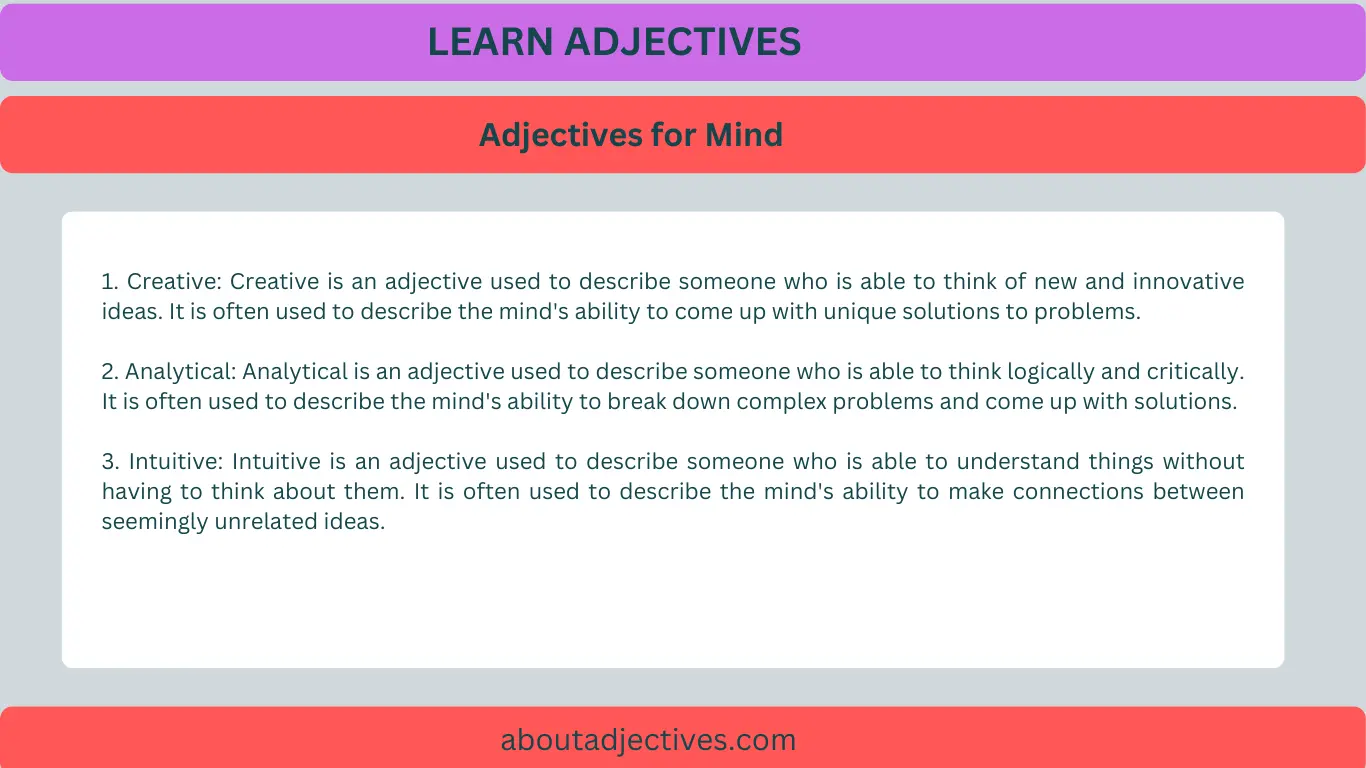Adjectives for Mind – Words For Mind
When it comes to describing the mind, there are many adjectives that can be used to accurately capture its complexity. The mind is a powerful tool that can be used to create, innovate, and solve problems. It is also a source of great joy and inspiration. In this article, we will explore some of the most commonly used adjectives to describe the mind. We will look at their meanings and how they can be used to accurately capture the power and potential of the mind.
Adjectives for Mind
1. Creative: Creative is an adjective used to describe someone who is able to think of new and innovative ideas. It is often used to describe the mind’s ability to come up with unique solutions to problems.
2. Analytical: Analytical is an adjective used to describe someone who is able to think logically and critically. It is often used to describe the mind’s ability to break down complex problems and come up with solutions.
3. Intuitive: Intuitive is an adjective used to describe someone who is able to understand things without having to think about them. It is often used to describe the mind’s ability to make connections between seemingly unrelated ideas.

4. Insightful: Insightful is an adjective used to describe someone who is able to see things from a different perspective. It is often used to describe the mind’s ability to make connections between ideas and come up with new solutions.
5. Logical: Logical is an adjective used to describe someone who is able to think in a systematic and organized way. It is often used to describe the mind’s ability to think through problems and come up with solutions.
6. Imaginative: Imaginative is an adjective used to describe someone who is able to think of new and creative ideas. It is often used to describe the mind’s ability to come up with unique solutions to problems.
7. Innovative: Innovative is an adjective used to describe someone who is able to think of new and creative ideas. It is often used to describe the mind’s ability to come up with unique solutions to problems.
8. Perceptive: Perceptive is an adjective used to describe someone who is able to understand things quickly and accurately. It is often used to describe the mind’s ability to make connections between ideas and come up with new solutions.
9. Analytic: Analytic is an adjective used to describe someone who is able to think logically and critically. It is often used to describe the mind’s ability to break down complex problems and come up with solutions.
10. Intelligent: Intelligent is an adjective used to describe someone who is able to think quickly and accurately. It is often used to describe the mind’s ability to make connections between ideas and come up with new solutions.
Conclusion
The mind is a powerful tool that can be used to create, innovate, and solve problems. There are many adjectives that can be used to accurately capture its complexity. From creative to analytical, intuitive to insightful, logical to imaginative, innovative to perceptive, analytic to intelligent, these adjectives can be used to accurately describe the power and potential of the mind.
FAQs
Q1. What is the purpose of using adjectives to describe the mind?
A1. The purpose of using adjectives to describe the mind is to accurately capture its complexity. Adjectives can be used to accurately describe the power and potential of the mind.
Q2. What are some of the most commonly used adjectives to describe the mind?
A2. Some of the most commonly used adjectives to describe the mind are creative, analytical, intuitive, insightful, logical, imaginative, innovative, perceptive, analytic, and intelligent.
Q3. How can adjectives be used to accurately capture the power and potential of the mind?
A3. Adjectives can be used to accurately capture the power and potential of the mind by describing its complexity. Adjectives can be used to describe the mind’s ability to think logically and critically, make connections between ideas, and come up with unique solutions to problems.




